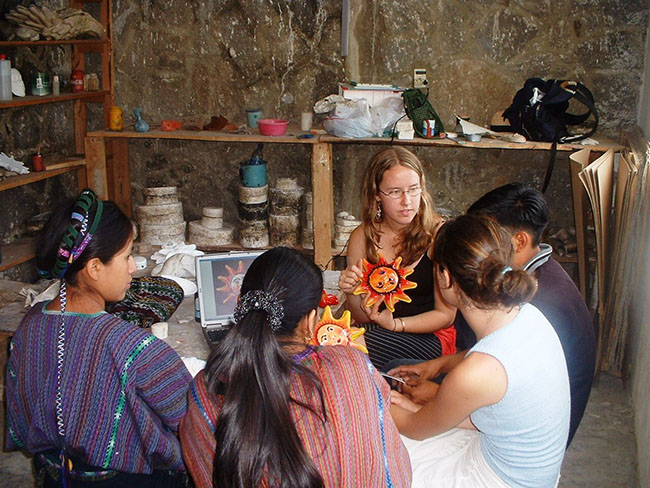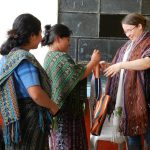
We hear so many stories of immigrant families making the painful decision to leave their homes and cross the border… but what if there were more economic opportunities in places like Guatemala? We talk to social entrepreneur Ruth Alvarez-DeGolia, who came up with the idea of Mercado Global. The accessory brand connects hundreds of women sewers in Guatemala to major fashion retailers (Nordstrom, Bloomingdale’s, Levi Strauss). As a result, women artisans make about $14.50 a day, far more than the average $2 a day, and are able to send their kids to school and provide for their families. Listen to the inspirational story of how Mercado Global came to be.
COLLEEN: Hello, I'm Colleen DeBaise.
SUE: And I'm Sue Williams.
COLLEEN: Here at The Story Exchange, we've often covered immigration issues and the recurring theme, of course, is that — if things were just better —
SUE: If there were more opportunities, in places like Guatemala and Honduras —
COLLEEN: — then much of the painful decisions we're seeing —
SUE: — families choosing to cross rivers, or walk for hundreds of miles with babies on their backs, or live in tent camps at the border —
COLLEEN: — maybe all of that wouldn't have to happen.
RUTH: My name is Ruth Álvarez-DeGolia and I'm executive director and founder of Mercado Global.
COLLEEN: The idea behind Mercado Global is simple — it's that…
RUTH: …rural indigenous women, rather than be victims of poverty, of sexism, of racism, of a lack of education, that they can be some of the best rural entrepreneurs in the world.
SUE: Ruth's social enterprise helps women artisans in Guatemala design and make…
RUTH: …bags, scarves, jewelry…
COLLEEN: …and then helps them earn critical income…
RUTH: …by helping connect them to major retailers in the fashion industry and selling to Nordstrom and Bloomingdale's and Levi Strauss.
SUE: The impact is huge.
RUTH: That allows them to use that income to send their kids to school, often for the first time which is a big, big deal.
COLLEEN: Ruth describes Mercado Global as working in the “epicenter” of the migration crisis.
RUTH: In the communities where we work, almost every single family has at least one family member who has gone to the U.S. Things have to be really, really bad for a family to make the decision that this is the least bad option. A lot of what we do is we make it possible for families to stay together and provide a way for parents to provide for their kids without feeling they have to have one of them make this really dangerous journey to the U.S.
LYDIA: Ola, bienvenidos a Mercado Global.
COLLEEN: Mercado Global has offices in New York and in Panajachel, Guatemala
LYDIA: Bienvenidos a nuestro espacio de sala de producción.
COLLEEN: And we'll play some tape of a woman named Lamberta.
LAMBERTA: Soy Lamberta. (speaking Spanish)
COLLEEN: She has worked for Mercado Global for 15 years, and she's saying her mother taught her how to weave.
SUE: She's using a backstrap loom to turn really beautifully colored yarn into fabric.
LAMBERTA: Tejidos para trabajar tenemos familia.
COLLEEN: She says she's hoping to get more weaving work to support families and allow them to study.
RUTH: Every Friday, all the weavers will come to office and drop off the fabric they wove that week, and the sewers come, and they drop off the finished bags that they made the previous week.
SUE (from tape): And let's say you get a big order from Bloomingdale's. Tell me what will happen.
RUTH: Sure. Mercado Global has 25 staff, of which about 20 are based at our offices in Guatemala and the rest are in Brooklyn.
COLLEEN: When her sales team gets an order…
RUTH: We send it to our team in Guatemala to produce it. We combine all the orders in our monthly shipments and produce it like one huge order so that we have efficiencies of scale. We've built what we call — internally, at least — a virtual factory model.
SUE: A handbag, for example, will be designed in Brooklyn…
COLLEEN: And then the weavers at the office in Panajachel will make the fabric.
SUE: And then the sewers —
COLLEEN: — and there are a lot of sewers —
SUE: — will pick up the fabric from the office and bring it back to their communities, to sew the bags.
RUTH: So we have 750 workplaces, because every woman works from home through her co-op, but we have the same production lead times and actually even faster product development lead times than a factory.
COLLEEN: Mercado Global is a 501(c)(3) nonprofit — and beyond just jobs, it provides extensive training; not just in sewing, but life skills in general.
RUTH: So we start with self-esteem training, financial literacy, how to open your first bank account, and then we also cover topics like women's health, childhood nutrition. So it's everything you need to run a successful business and everything you need where education can help provide a better life for your family.
SUE: The difference that Ruth and her social enterprise have made in these women's lives is incredible.
COLLEEN: Here's some tape of a sewer named Isabel.
ISABEL: Antes de la gente solo la mujer tiene que mantener en la casa hacer oficios.
COLLEEN: She's talking about how women have traditionally stayed in the home.
RUTH: Isabel had to drop out of school in the sixth grade to help provide for her family when she was very young. She's very beautiful, really sweet.
ISABEL: Cada mes ellas hablan que ahorita las mujeres tienen derecho antes la gente si.
RUTH: She had heard about Mercado Global and she came to the town where our offices are based, knocking door to door, looking for us.
SUE: Ruth remembers how little self-esteem Isabel had at first.
RUTH: She was always looking down, very quiet; could not get her to look you in the face.
COLLEEN: Mercado Global trained Isabel and helped her build a sewing coop in her community.
RUTH: And within six months, she was making so much income that she was able to pay personally to send three of her younger sisters to school. It's just such a great example of how a woman's life can be transformed when she has access to her own income.
SUE: Isabel is now the family breadwinner.
ISABEL: Trabajé solo eso del pedido de mercado.
RUTH: So now she's our top sewer. She’s our top sample maker. She's also our top trainer. She's always at our office working on samples, and you always know she's there because you can hear her laughing from across the building. The women we work with, they're amazing. They just need a chance.
COLLEEN: We'll be right back.
COMMERCIAL: The Story Exchange is a nonprofit media company dedicated to elevating women’s voices. If you like what you’re hearing, check out our podcast featuring Kate Curran, who quit her corporate job to launch School the World, building schoolhouses in Guatemala. “We believe we will have every child graduating from primary school knowing how to read, write and count.” It's Ep. 33: Instead of Building a Wall…
COLLEEN: We've been sharing the story of Ruth Álvarez-DeGolia, who connects rural entrepreneurs in Guatemala to international retailers.
SUE: She started Mercado Global in 2004 while still a student at Yale University.
RUTH: I double majored in ethics, politics, and economics in an international studies with a concentration on transitional justice.
SUE (from tape): On which justice?
RUTH: Transitional justice. It's how countries transition from underdevelopment to development or from authoritarianism to democracy, or the reverse.
COLLEEN: To further her studies, she visited Guatemala…
RUTH: It's such a beautiful country.
COLLEEN: …volunteering for an organization that helps rural entrepreneurs build websites, apply for grants and get business resources.
RUTH: It was really exciting to, instead of being in the ivory tower talking about it, to actually be on the ground doing something. I had never felt so useful in my entire life.
SUE: Some of the women artisans asked her to sell their products back home.
RUTH: I set up a little table on campus and sold, in one weekend, about $5,000 in products, and it paid for elementary school for 26 little girls for a whole year.
COLLEEN: But Ruth knew she needed to think bigger.
SUE: Which fit in with her thesis perfectly.
RUTH: My thesis on the impact of globalization on political and economic development in Guatemala.
COLLEEN: Globalization, she realized, was a tool that could be used for empowerment.
RUTH: And that's really where Mercado Global started; just, if these women could access the international market, they could leapfrog over all of the racism and discrimination that they were experiencing locally, all of the exclusion, and they could earn so much more.
COLLEEN: She raised seed money for the idea through Yale's business plan competition and through the organization Echoing Green, which funds early-stage social enterprises.
RUTH: In total it was, I think, about $140,000.
SUE (from tape): Wow.
RUTH: Yeah. We were very fortunate to receive quite a bit of startup funding, considering we were undergrads!
COLLEEN: Today, over 15 years later, Mercado Global continues to grow. Like many companies, it made a pandemic pivot.
RUTH: As soon as the pandemic started hitting New York City, we just started going into our inventory room, taking all the thousands of yards of fabric we had, and sewing as many masks as artisans could produce.
SUE: It was a lifeline for many of the women.
RUTH: Every week we'd ship out 10,000 masks to different hospitals and nursing homes in New York City.
COLLEEN: And now, Mercado Globale is back making new apparel. Here's Alyssa Burgos, director of merchandising, announcing the new collection "Las Manos" last summer. “Las manos” means “the hands” in Spanish.
ALYSSA: Our designer was really inspired by the sense of touch that we were all missing throughout Covid. All of our fabrics are woven on either a floor loom or a back strap, which are ancient weaving techniques that have been passed down from generation to generation within Guatemala.
SUE: Since the pandemic began, Mercado has launched 7 new collections, with more that 350 styles, including bags and accessories.
COLLEEN: Sales revenue grew 30% percent in the past year. And it's recruited 100 more women.
SUE (from tape): How much might she make a year?
RUTH: So on average, most people in Guatemala's highlands are living on a little over $2 a day. So actually when working with us, artisans earn about $14.50 a day. So it's a lot more than they would be earning otherwise. On average we are about tripling or quadrupling what they're earning per year.
COLLEEN: Wow.
SUE: Truly amazing, the work they're doing.
COLLEEN: We thank Ruth Álvarez-DeGolia for sharing her story.
SUE: And we thank you for listening.
OUTTRO: This has been The Story Exchange. Join us next time to hear more stories about innovative and inspirational women doing the things you’d never dream of. Or…maybe you would. If you liked this podcast, please share on social media or post a review wherever you listen. It helps other people find the show. And visit our website at TheStoryExchange.org, where you’ll find news, videos and tips for entrepreneurial women. And we’d love to hear from you: Drop us a line at [email protected] — or find us on Facebook. I'm Colleen DeBaise. Sound editing provided by Nusha Balyan. Interview recorded by Sam Shinn. Production coordinator is Noël Flego. Our mixer is Pat Donohue at String & Can. Executive producers are Sue Williams and Victoria Wang. Recorded at Cutting Room Studios in New York City.


